情态动词的基本用法归纳
情态动词的用法
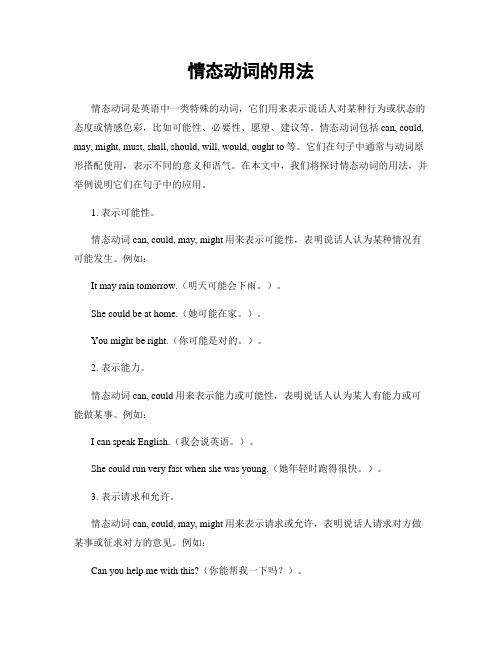
情态动词的用法情态动词是英语中一类特殊的动词,它们用来表示说话人对某种行为或状态的态度或情感色彩,比如可能性、必要性、愿望、建议等。
情态动词包括can, could, may, might, must, shall, should, will, would, ought to等。
它们在句子中通常与动词原形搭配使用,表示不同的意义和语气。
在本文中,我们将探讨情态动词的用法,并举例说明它们在句子中的应用。
1. 表示可能性。
情态动词can, could, may, might用来表示可能性,表明说话人认为某种情况有可能发生。
例如:It may rain tomorrow.(明天可能会下雨。
)。
She could be at home.(她可能在家。
)。
You might be right.(你可能是对的。
)。
2. 表示能力。
情态动词can, could用来表示能力或可能性,表明说话人认为某人有能力或可能做某事。
例如:I can speak English.(我会说英语。
)。
She could run very fast when she was young.(她年轻时跑得很快。
)。
3. 表示请求和允许。
情态动词can, could, may, might用来表示请求或允许,表明说话人请求对方做某事或征求对方的意见。
例如:Can you help me with this?(你能帮我一下吗?)。
Could I use your pen?(我可以用一下你的笔吗?)。
May I come in?(我可以进来吗?)。
4. 表示必要性。
情态动词must, should, ought to用来表示必要性或建议,表明说话人认为某种行为是必要的或值得做的。
例如:You must finish your homework before you go out to play.(你必须在出去玩之前完成作业。
)。
You should apologize to her.(你应该向她道歉。
情态动词的用法归纳
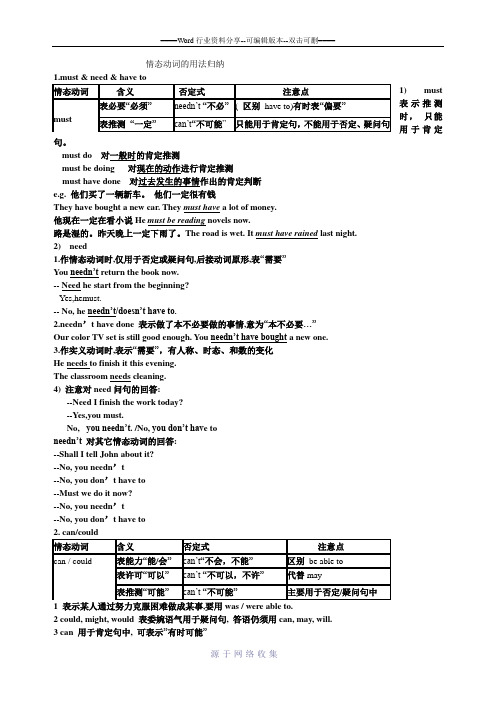
情态动词的用法归纳1) must 表示推测时, 只能用于肯定句。
must do 对一般时的肯定推测must be doing 对现在的动作进行肯定推测must have done 对过去发生的事情作出的肯定判断e.g. 他们买了一辆新车。
他们一定很有钱They have bought a new car. They must have a lot of money.他现在一定在看小说He must be reading novels now.路是湿的。
昨天晚上一定下雨了。
The road is wet. It must have rained last night.2) need1.作情态动词时,仅用于否定或疑问句,后接动词原形,表“需要”You needn’t return the book now.-- Need he start from the beginning?--Yes,hemust. -- No, he needn’t/doesn’t have to.2.needn ’t have done 表示做了本不必要做的事情,意为“本不必要…”Our color TV set is still good enough. You needn’t have bought a new one.3.作实义动词时,表示“需要”,有人称、时态、和数的变化He needs to finish it this evening.The classroom needs cleaning.4) 注意对need 问句的回答:--Need I finish the work today?--Yes,you must.No,you needn’t . /No, you don’t hav e toneedn’t 对其它情态动词的回答:--Shall I tell John about it?--No, you needn ’t--No, you don ’t have to--Must we do it now?--No, you needn ’t--No, you don ’t have to1 表示某人通过努力克服困难做成某事,要用was / were able to.2 could, might, would 表委婉语气用于疑问句, 答语仍须用can, may, will.3 can 用于肯定句中, 可表示”有时可能”4. can/could have done “本可以,本可能做某事” 用于肯定句中,表示对过去发生的事情做出的判断。
情态动词的用法完整详细
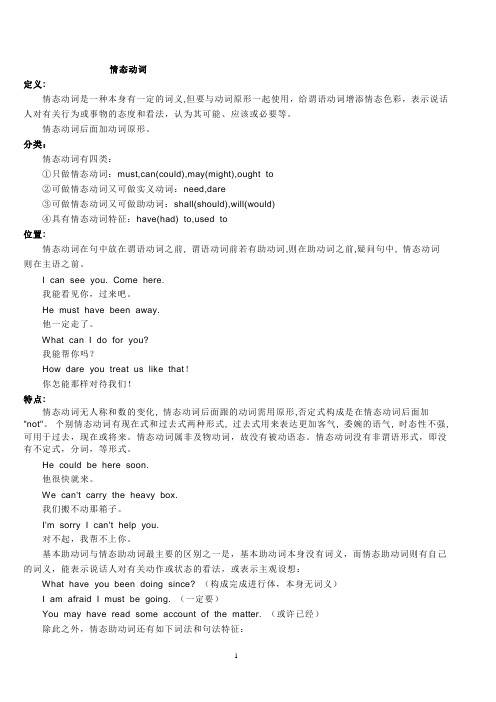
情态动词定义:情态动词是一种本身有一定的词义,但要与动词原形一起使用,给谓语动词增添情态色彩,表示说话人对有关行为或事物的态度和看法,认为其可能、应该或必要等。
情态动词后面加动词原形。
分类:情态动词有四类:①只做情态动词:must,can(could),may(might),ought to②可做情态动词又可做实义动词:need,dare③可做情态动词又可做助动词:shall(should),will(would)④具有情态动词特征:have(had) to,used to位置:情态动词在句中放在谓语动词之前, 谓语动词前若有助动词,则在助动词之前,疑问句中, 情态动词则在主语之前。
I can see you. Come here.我能看见你,过来吧。
He must have been away.他一定走了。
What can I do for you?我能帮你吗?How dare you treat us like that!你怎能那样对待我们!特点:情态动词无人称和数的变化, 情态动词后面跟的动词需用原形,否定式构成是在情态动词后面加"not"。
个别情态动词有现在式和过去式两种形式, 过去式用来表达更加客气, 委婉的语气, 时态性不强, 可用于过去,现在或将来。
情态动词属非及物动词,故没有被动语态。
情态动词没有非谓语形式,即没有不定式,分词,等形式。
He could be here soon.他很快就来。
We can't carry the heavy box.我们搬不动那箱子。
I'm sorry I can't help you.对不起,我帮不上你。
基本助动词与情态助动词最主要的区别之一是,基本助动词本身没有词义,而情态助动词则有自己的词义,能表示说话人对有关动作或状态的看法,或表示主观设想:What have you been doing since? (构成完成进行体,本身无词义)I am afraid I must be going. (一定要)You may have read some account of the matter. (或许已经)除此之外,情态助动词还有如下词法和句法特征:1)除ought和used以外,其他情态动词后面只能接不带to的不定式。
情态动词的基本用法归纳
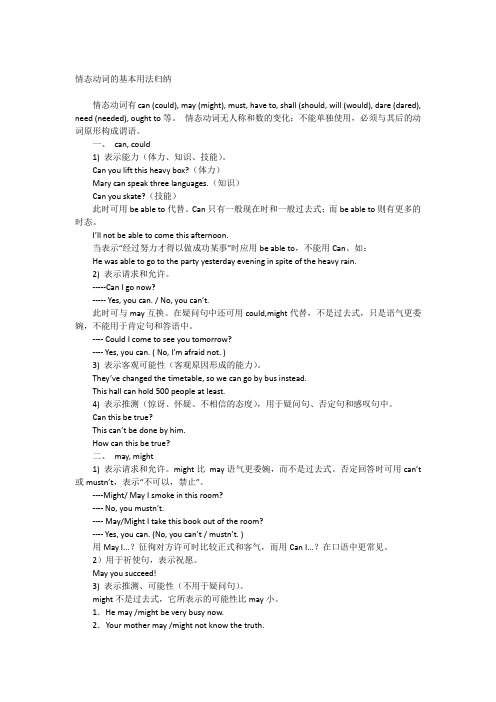
情态动词的基本用法归纳情态动词有can (could), may (might), must, have to, shall (should, will (would), dare (dared), need (needed), ought to等。
情态动词无人称和数的变化;不能单独使用,必须与其后的动词原形构成谓语。
一、can, could1) 表示能力(体力、知识、技能)。
Can you lift this heavy box?(体力)Mary can speak three languages.(知识)Can you skate?(技能)此时可用be able to代替。
Can只有一般现在时和一般过去式;而be able to则有更多的时态。
I’ll not be able to come this afternoon.当表示“经过努力才得以做成功某事”时应用be able to,不能用Can。
如:He was able to go to the party yesterday evening in spite of the heavy rain.2) 表示请求和允许。
-----Can I go now?----- Yes, you can. / No, you can’t.此时可与may互换。
在疑问句中还可用could,might代替,不是过去式,只是语气更委婉,不能用于肯定句和答语中。
---- Could I come to see you tomorrow?---- Yes, you can. ( No, I’m afraid not. )3) 表示客观可能性(客观原因形成的能力)。
T hey’ve changed the timetable, so we can go by bus instead.This hall can hold 500 people at least.4) 表示推测(惊讶、怀疑、不相信的态度),用于疑问句、否定句和感叹句中。
高中英语情态动词的常用用法归纳(超详细)
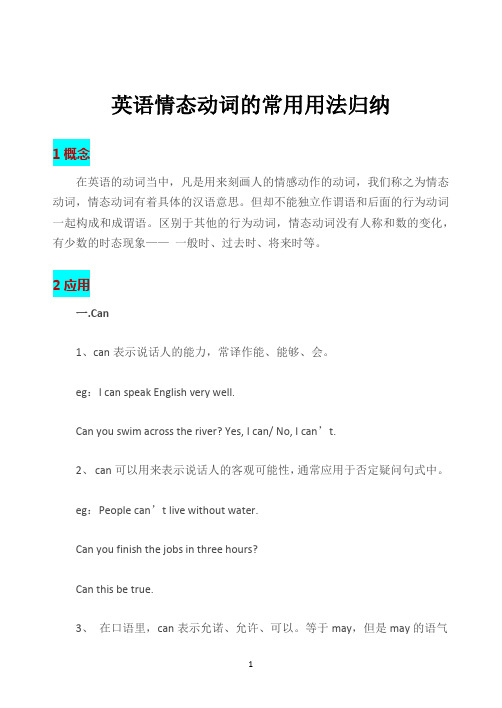
英语情态动词的常用用法归纳1概念在英语的动词当中,凡是用来刻画人的情感动作的动词,我们称之为情态动词,情态动词有着具体的汉语意思。
但却不能独立作谓语和后面的行为动词一起构成和成谓语。
区别于其他的行为动词,情态动词没有人称和数的变化,有少数的时态现象——一般时、过去时、将来时等。
2应用一.Can1、can表示说话人的能力,常译作能、能够、会。
eg:I can speak English very well.Can you swim across the river? Yes, I can/ No, I can’t.2、can可以用来表示说话人的客观可能性,通常应用于否定疑问句式中。
eg:People can’t live without water.Can you finish the jobs in three hours?Can this be true.3、在口语里,can表示允诺、允许、可以。
等于may,但是may的语气重于can。
eg:Can I come in? = May I come in?Can I use your bike? = May I use your bike ?*表示允许可以may mightcould can4、在“过去时”的语境里,通常用could 表示它的过去式,用be able to 短语(was/were)而could通常用来在一般现在时的语境里表示委婉语气eg:Could(can)you show me the way to the supermarket?5、can表示猜测(1)对现在状态的一种猜测,只能用在否定疑问句中。
eg:Zhang can’t be ill really?This can’t be done by him.(2)对现在动作的猜测eg: The boy can’t be telling lies.Mary works so hard, now, she can’t be sleeping.(3)对过去动作的一种猜测eg:He can’t have gone to the bookshop yesterday.Mother couldn’t have said it.6、can(could)惯用法(1)can’t wait to do 迫不及待做…….eg: Children can’t wait to eat apples in the basket.(2)can’t help doing 情不自禁做某事。
情态动词的基本用法
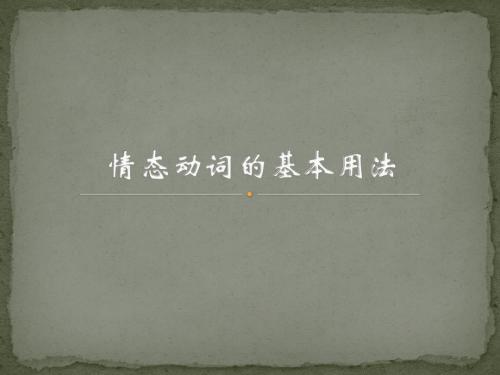
1. can的基本用法: ⑴ 表示体力或智力上的能力,即“能够,会”,可与be able to转换。 例:He can speak English. = He is able to speak English. —Can you play basketball? — No, I can’t. 如果表示将来具备的能力,要用will be able to。 例:If I have a good sleep, I will be able to do the problem. ⑵ 表示许可,主要用于口语,书面语一般用may。 例:—Can we go home now, please? — No, you can’t. You can only smoke in this room. You can’t keep the library books for more than a month.
1. can的基本用法: ⑶ 表示“可能”,与may同义,但一般用在疑问句中。 例:What can he possibly want? 在否定句中,否定形式can’t表示推测“不大可能”。 例:Anybody can make mistakes. The news can’t be true. 与第一、二人称连用时,还可以就可能的解决问题的方式或可能的行为 提出建议。在这里,也可用could使语气婉转。 例:Can / Could we meet again next week? 下周我们可以再见面吗? —What shall we do? 我们怎么办呢? — We can / could try asking Lucy for help. ——我们可以请露茜帮忙试试 看。 You can / could help me with the cooking. 你可以帮我做饭。
情态动词用法归纳(全)
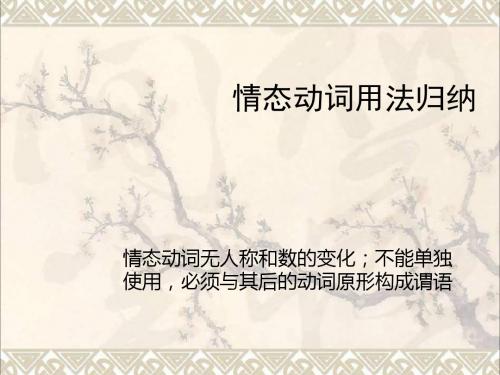
情态动词无人称和数的变化;不能单独 使用,必须与其后的动词原形构成谓语
一、 can, could
一、 can, could
一、 can, could
3) 表示客观可能性(客观原因形成的能力)。 They’ve changed the timetable, so we can go by bus instead. This hall can hold 500 people at least.
六、 will, would
3) would表示过去反复发生的动作或某种倾向。would表示 过去习惯时比used to正式,且没有“现已无此习惯”的 含义。
1. During the vacation, he would visit me every other day. 2. The wound would not heal. 4) 表示估计和猜想。
should , ought to (客观推测), must(主观推测)。 1.He must be home by now. (断定他已到家) 2.He ought to/should be home by now.(不太肯定) 3. This is where the oil must be.(直爽) 4. This is where the oil ought to/should be.(含蓄)
2)用于祈使句,表示祝愿。 May you succeed!
二、 may, might
3) 表示推测、可能性(不用于疑问句)。 might不是过去式,它所表示的可能性比may小。 1.He may /might be very busy now. 2.Your mother may /might not know the truth.
情态动词的用法归纳
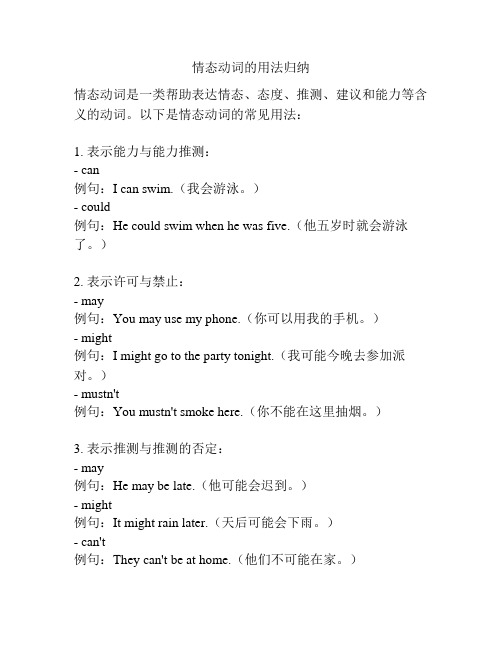
情态动词的用法归纳情态动词是一类帮助表达情态、态度、推测、建议和能力等含义的动词。
以下是情态动词的常见用法:1. 表示能力与能力推测:- can例句:I can swim.(我会游泳。
)- could例句:He could swim when he was five.(他五岁时就会游泳了。
)2. 表示许可与禁止:- may例句:You may use my phone.(你可以用我的手机。
)- might例句:I might go to the party tonight.(我可能今晚去参加派对。
)- mustn't例句:You mustn't smoke here.(你不能在这里抽烟。
)3. 表示推测与推测的否定:- may例句:He may be late.(他可能会迟到。
)- might例句:It might rain later.(天后可能会下雨。
)- can't例句:They can't be at home.(他们不可能在家。
)4. 表示义务与责任:- must例句:We must finish our homework.(我们必须完成作业。
)- have to例句:I have to go to work early tomorrow.(我明天必须早点去上班。
)5. 表示愿望与建议:- should例句:You should exercise regularly.(你应该经常锻炼。
)- ought to例句:They ought to help others.(他们应该帮助别人。
)6. 表示推荐与要求:- would like例句:I would like to have a cup of tea.(我想要一杯茶。
)- need例句:You need to finish this report by tomorrow.(你需要在明天之前完成这份报告。
情态动词用法归纳(全)

三、 must, have to
1) 表示必须、必要。 You must come in time. 在回答引出的问句时,如果是否定的,不能用mustn’t(禁止,
不准),而用needn’t, don’t have to(不必). ---- Must we hand in our exercise books today? ---- Yes, you must. ---- No, you don’t have to / you needn’t.
May I borrow your bike? 我可以借你的自行车吗? You may go home now. 现在你可以回家了。 (2) 表示推测,谈论可能性,意为“ 可能, 或许”,一般 用于肯定句中。 如: It may rain tomorrow . 明天可能会下雨。 She may be at home. 她可能在家呢. (3) may的过去式为might ,表示推测时。可能性低于may 。 如:
2) 表示劝告、建议和命令。should, ought to可通用,但在疑 问句中常用should。
1. You should / ought to go to class right away.
2. Should I open the window?
3) 表示推测
七、should, ought to
六、 will, would
3) would表示过去反复发生的动作或某种倾向。would表示 过去习惯时比used to正式,且没有“现已无此习惯”的 含义。
1. During the vacation, he would visit me every other day. 2. The wound would not heal. 4) 表示估计和猜想。 It would be about ten o’clock when she left home.
情态动词详细用法归纳
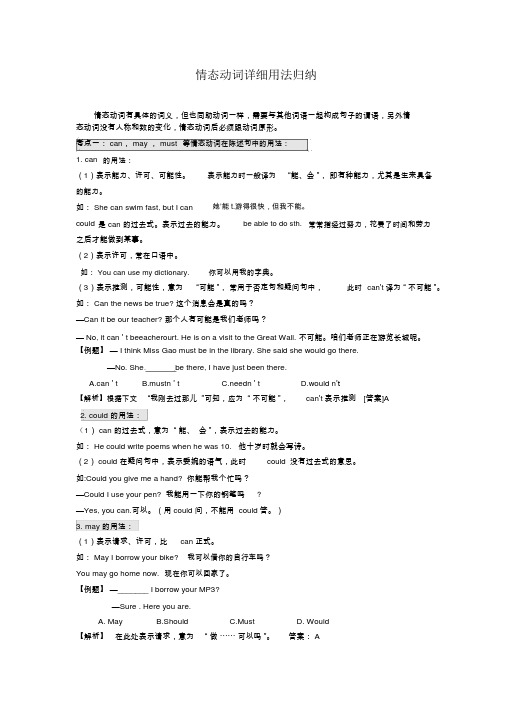
情态动词详细用法归纳情态动词有具体的词义,但也同助动词一样,需要与其他词语一起构成句子的谓语,另外情态动词没有人称和数的变化,情态动词后必须跟动词原形。
考点一: can, may , must等情态动词在陈述句中的用法:1. can的用法:(1)表示能力、许可、可能性。
表示能力时一般译为“能、会”,即有种能力,尤其是生来具备的能力。
如: She can swim fast, but I can她’能t.游得很快,但我不能。
could是 can 的过去式。
表示过去的能力。
be able to do sth.常常指经过努力,花费了时间和劳力之后才能做到某事。
(2)表示许可,常在口语中。
如: You can use my dictionary.你可以用我的字典。
(3)表示推测,可能性,意为“可能”,常用于否定句和疑问句中,此时can’t译为“不可能”。
如: Can the news be true? 这个消息会是真的吗?—Can it be our teacher? 那个人有可能是我们老师吗?— No, it can ’ t beeacherourt. He is on a visit to the Great Wall. 不可能。
咱们老师正在游览长城呢。
【例题】— I think Miss Gao must be in the library. She said she would go there.—No. She be there, I have just been there.A.can ’ tB.mustn ’ tC.needn ’ tD.would n’t【解析】根据下文“我刚去过那儿”可知,应为“ 不可能”,can’t表示推测[答案]A2.could 的用法:(1) can 的过去式,意为“能、会”,表示过去的能力。
如: He could write poems when he was 10. 他十岁时就会写诗。
情态动词的用法归纳
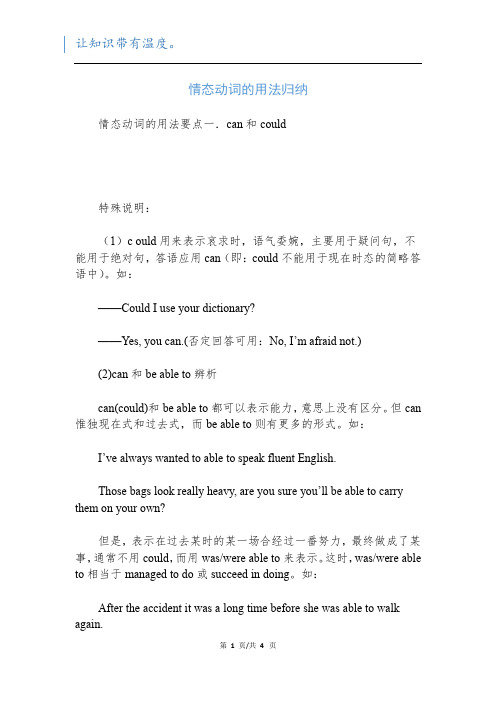
情态动词的用法归纳情态动词的用法要点一.can和could特殊说明:(1)c ould用来表示哀求时,语气委婉,主要用于疑问句,不能用于绝对句,答语应用can(即:could不能用于现在时态的简略答语中)。
如:——Could I use your dictionary?——Yes, you can.(否定回答可用:No, I’m afraid not.)(2)can和be able to辨析can(could)和be able to都可以表示能力,意思上没有区分。
但can 惟独现在式和过去式,而be able to则有更多的形式。
如:I’ve always wanted to able to speak fluent English.Those bags look really heavy, are you sure you’ll be able to carry them on your own?但是,表示在过去某时的某一场合经过一番努力,最终做成了某事,通常不用could,而用was/were able to来表示。
这时,was/were able to相当于managed to do或succeed in doing。
如:After the accident it was a long time before she was able to walk again.The fire was very big, but most people were able to escape from the building.(3) 惯用形式“cannot …too…”表示“无论怎么……也不(过分)”。
如:You cannot be too careful.你越当心越好。
惯用形式“cannot but+ 不定式(不带to)”表示“不得不,只好”。
如:I cannot but admire her determination.我不得不敬佩你的决心。
情态动词用法总结归纳
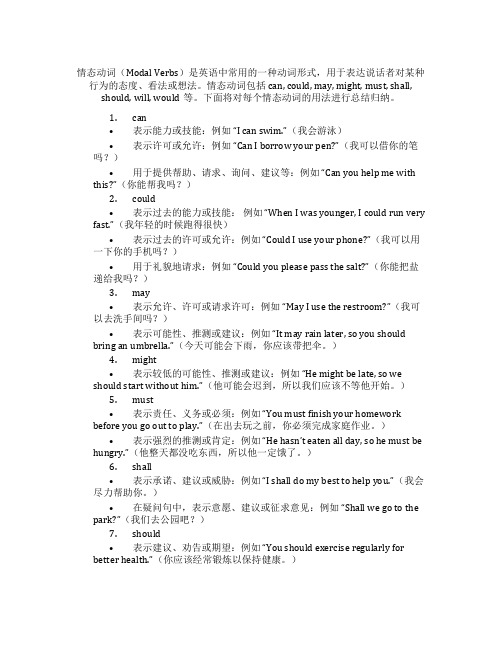
情态动词(Modal Verbs)是英语中常用的一种动词形式,用于表达说话者对某种行为的态度、看法或想法。
情态动词包括can, could, may, might, must, shall, should, will, would等。
下面将对每个情态动词的用法进行总结归纳。
1.can•表示能力或技能:例如“I can swim.”(我会游泳)•表示许可或允许:例如“Can I borrow your pen?”(我可以借你的笔吗?)•用于提供帮助、请求、询问、建议等:例如“Can you help me with this?”(你能帮我吗?)2.could•表示过去的能力或技能:例如“When I was younger, I could run very fast.”(我年轻的时候跑得很快)•表示过去的许可或允许:例如“Could I use your phone?”(我可以用一下你的手机吗?)•用于礼貌地请求:例如“Could you please pass the salt?”(你能把盐递给我吗?)3.may•表示允许、许可或请求许可:例如“May I use the restroom?”(我可以去洗手间吗?)•表示可能性、推测或建议:例如“It may rain later, so you should bring an umbrella.”(今天可能会下雨,你应该带把伞。
)4.might•表示较低的可能性、推测或建议:例如“He might be late, so we should start without him.”(他可能会迟到,所以我们应该不等他开始。
)5.must•表示责任、义务或必须:例如“You must finish your homewor k before you go out to play.”(在出去玩之前,你必须完成家庭作业。
)•表示强烈的推测或肯定:例如“He hasn’t eaten all day, so he must be hungry.”(他整天都没吃东西,所以他一定饿了。
情态动词的用法归纳终极版
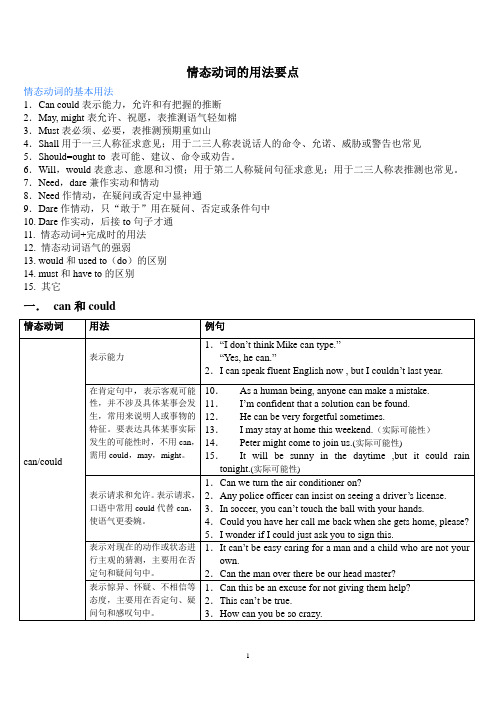
情态动词的用法要点情态动词的基本用法1.Can could表示能力,允许和有把握的推断2.May, might表允许、祝愿,表推测语气轻如棉3.Must表必须、必要,表推测预期重如山4.Shall用于一三人称征求意见;用于二三人称表说话人的命令、允诺、威胁或警告也常见5.Should=ought to 表可能、建议、命令或劝告。
6.Will,would表意志、意愿和习惯;用于第二人称疑问句征求意见;用于二三人称表推测也常见。
7.Need,dare兼作实动和情动8.Need作情动,在疑问或否定中显神通9.Dare作情动,只“敢于”用在疑问、否定或条件句中10. Dare作实动,后接to句子才通11. 情态动词+完成时的用法12. 情态动词语气的强弱13. would和used to(do)的区别14. must和have to的区别15. 其它一.can和could特别说明:(1)could用来表示请求时,语气委婉,主要用于疑问句,不能用于肯定句,答语应用can(即:could不能用于现在时态的简略答语中)。
如:——Could I use your dictionary?——Yes, you can.(否定回答可用:No, I’m afraid not.)(2)can和be able to辨析can(could)和be able to都可以表示能力,意思上没有区别。
但can只有现在式和过去式,而be able to则有更多的形式。
如:I’ve always wanted to able to speak fluent English.Those bags look really heavy, are you sure you’ll be able to carry them on your own?但是,表示在过去某时的某一场合经过一番努力,终于做成了某事,通常不用could,而用was/were able to来表示。
情态动词用法归纳(全)

(4) 表示推测,意为“可能”, 常用于否 定句和疑问句中, 此时can ’ t 译为“ 不可能”。 如:
Can the news be true? 这个消息会是 真的吗? ----Can it be our teacher? 那个人有可能是我们老师吗?
1. You shall fail if you don’t work hard.(警告)
2. He shall have the book when I finish it.(允诺)
3. He shall be punished.(威胁)
六、 will, would
1) 表示请求、建议等,would更委婉。
(2) 表示可能、能够。 如:
I can finish it in an hour. 我能在一 小时后完成它。
----No, it can’t be our teacher. He is on a visit to the Great Wall.
不可能。咱们老师正在游览长城呢。
2. could的用法
1. How dare you say I’m unfair? 2. He daren’t speak English before such a crowd, dare he? 3. If we dared not go there that day, we couldn’t get the beautiful flowers. 2) need 作情态动词用时 , 常用于疑问句、否定句。在肯定句中一般用 must, have to, ought to, should代替。 1.You needn’t come so early. 2. ---- Need I finish the work today? ---- Yes, you must. / No, you needn’t.
情态动词的基本用法
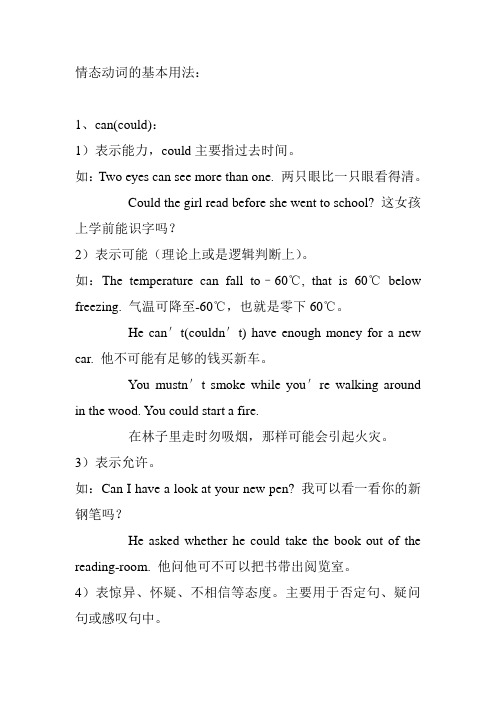
情态动词的基本用法:1、can(could):1)表示能力,could主要指过去时间。
如:Two eyes can see more than one. 两只眼比一只眼看得清。
Could the girl read before she went to school? 这女孩上学前能识字吗?2)表示可能(理论上或是逻辑判断上)。
如:The temperature can fall to–60℃, that is 60℃below freezing. 气温可降至-60℃,也就是零下60℃。
He can′t(couldn′t) have enough money for a new car. 他不可能有足够的钱买新车。
You mustn′t smoke while you′re walking around in the wood. You could start a fire.在林子里走时勿吸烟,那样可能会引起火灾。
3)表示允许。
如:Can I have a look at your new pen? 我可以看一看你的新钢笔吗?He asked whether he could take the book out of the reading-room. 他问他可不可以把书带出阅览室。
4)表惊异、怀疑、不相信等态度。
主要用于否定句、疑问句或感叹句中。
如:Where can(could) they have gone to? 他们会去哪儿了呢?He can′t(couldn′t) be over sixty. 他不可能超过六十岁。
How can you be so careless? 你怎么这么粗心?5)比较委婉客气地提出问题或陈述看法。
如:Can(Could) you lend me a hand? 帮我一把好吗?I′m afraid we couldn′t give you an answer today. 恐怕我们今天不能给你答复。
情态动词的用法总结
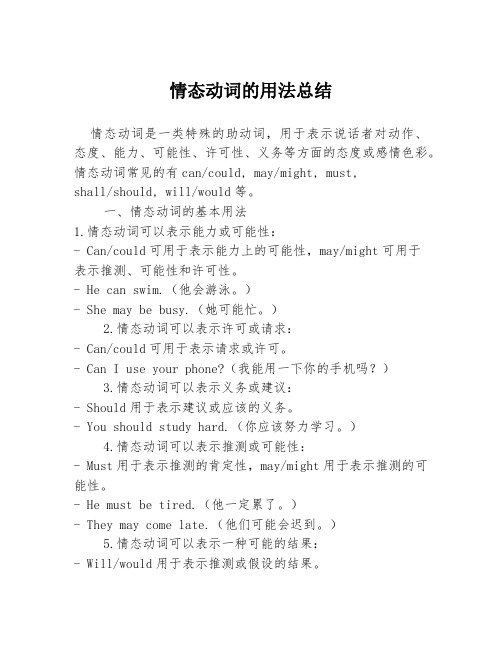
情态动词的用法总结情态动词是一类特殊的助动词,用于表示说话者对动作、态度、能力、可能性、许可性、义务等方面的态度或感情色彩。
情态动词常见的有can/could, may/might, must,shall/should, will/would等。
一、情态动词的基本用法1.情态动词可以表示能力或可能性:- Can/could可用于表示能力上的可能性,may/might可用于表示推测、可能性和许可性。
- He can swim.(他会游泳。
)- She may be busy.(她可能忙。
)2.情态动词可以表示许可或请求:- Can/could可用于表示请求或许可。
- Can I use your phone?(我能用一下你的手机吗?)3.情态动词可以表示义务或建议:- Should用于表示建议或应该的义务。
- You should study hard.(你应该努力学习。
)4.情态动词可以表示推测或可能性:- Must用于表示推测的肯定性,may/might用于表示推测的可能性。
- He must be tired.(他一定累了。
)- They may come late.(他们可能会迟到。
)5.情态动词可以表示一种可能的结果:- Will/would用于表示推测或假设的结果。
- If it rains, we will stay indoors.(如果下雨了,我们就呆在室内。
)二、情态动词的注意事项1.情态动词没有人称和数的变化,后面直接跟动词原形。
- He can play the piano.(他会弹钢琴。
)2.情态动词后面的动词一般用原形,表示动作和状态。
- I can swim.(我会游泳。
)- They should apologize.(他们应该道歉。
)3.情态动词用于疑问句时,直接将情态动词置于句首。
- Can you swim?(你会游泳吗?)4.情态动词用于否定句时,直接在情态动词前加"not"。
情态动词的用法归纳总结 小学英语情态动词的基本用法
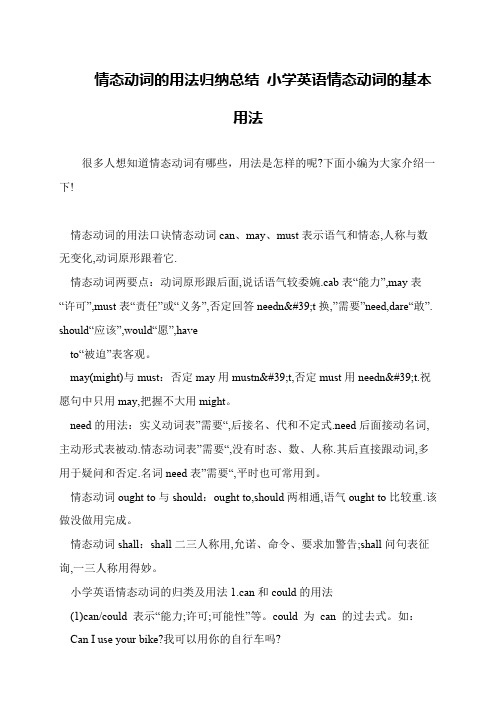
情态动词的用法归纳总结小学英语情态动词的基本
用法
很多人想知道情态动词有哪些,用法是怎样的呢?下面小编为大家介绍一下!
情态动词的用法口诀情态动词can、may、must表示语气和情态,人称与数无变化,动词原形跟着它.
情态动词两要点:动词原形跟后面,说话语气较委婉.cab表“能力”,may表“许可”,must表“责任”或“义务”,否定回答needn't换,”需要”need,dare“敢”. should“应该”,would“愿”,have
to“被迫”表客观。
may(might)与must:否定may用mustn't,否定must用needn't.祝愿句中只用may,把握不大用might。
need的用法:实义动词表”需要“,后接名、代和不定式.need后面接动名词,主动形式表被动.情态动词表”需要“,没有时态、数、人称.其后直接跟动词,多用于疑问和否定.名词need表”需要“,平时也可常用到。
情态动词ought to与should:ought to,should两相通,语气ought to比较重.该做没做用完成。
情态动词shall:shall二三人称用,允诺、命令、要求加警告;shall问句表征询,一三人称用得妙。
小学英语情态动词的归类及用法1.can和could的用法
(1)can/could 表示“能力;许可;可能性”等。
could 为can 的过去式。
如:
Can I use your bike?我可以用你的自行车吗?。
情态动词基本用法及举例
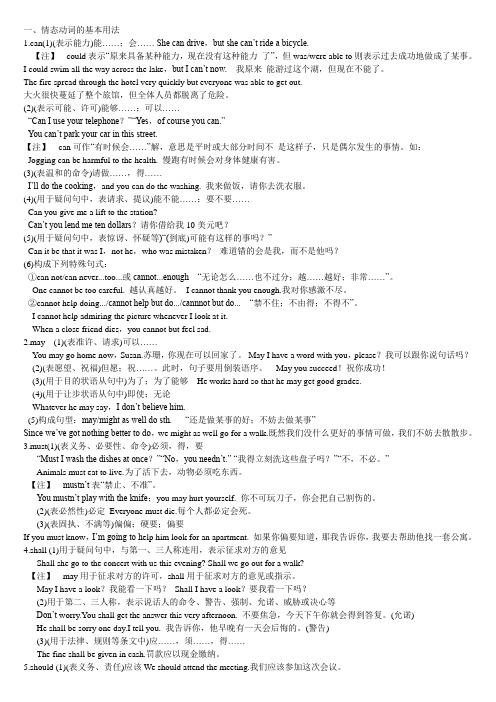
一、情态动词的基本用法1.can(1)(表示能力)能……;会…… She can drive,but she can’t ride a bicycle.【注】could表示“原来具备某种能力,现在没有这种能力了”,但was/were able to则表示过去成功地做成了某事。
I could swim all the way across the lake,but I can’t now. 我原来能游过这个湖,但现在不能了。
The fire spread through the hotel very quickly but everyone was able to get out.大火很快蔓延了整个旅馆,但全体人员都脱离了危险。
(2)(表示可能、许可)能够……;可以……“Can I use your telephone?”“Yes,of course you can.”You can’t park your car in this street.【注】can可作“有时候会……”解,意思是平时或大部分时间不是这样子,只是偶尔发生的事情。
如:Jogging can be harmful to the health. 慢跑有时候会对身体健康有害。
(3)(表温和的命令)请做……,得……I’ll do the cooking,and you can do the washing. 我来做饭,请你去洗衣服。
(4)(用于疑问句中,表请求、提议)能不能……;要不要……Can you give me a lift to the station?Can’t you lend me ten dollars?请你借给我10美元吧?(5)(用于疑问句中,表惊讶、怀疑等)“(到底)可能有这样的事吗?”Can it be that it was I,not he,who was mistaken?难道错的会是我,而不是他吗?(6)构成下列特殊句式:①can not/can never...too...或cannot...enough “无论怎么……也不过分;越……越好;非常……”。
- 1、下载文档前请自行甄别文档内容的完整性,平台不提供额外的编辑、内容补充、找答案等附加服务。
- 2、"仅部分预览"的文档,不可在线预览部分如存在完整性等问题,可反馈申请退款(可完整预览的文档不适用该条件!)。
- 3、如文档侵犯您的权益,请联系客服反馈,我们会尽快为您处理(人工客服工作时间:9:00-18:30)。
情态动词的基本用法归纳情态动词有can(could),may(might),must,haveto,shall(should,will(would), dare(dared),need(needed),oughtto等。
情态动词无人称和数的变化;不能单独使用,必须与其后的动词原形构成谓语。
一、can,could1)表示能力(体力、知识、技能)。
Canyouliftthisheavybox?(体力)Marycanspeakthreelanguages.(知识)Canyouskate?(技能)此时可用beableto代替。
Can只有一般现在时和一般过去式;而beableto则有更多的时态。
I’llnotbeabletocomethisafternoon.当表示“经过努力才得以做成功某事”时应用beableto,不能用Can。
如:Hewasabletogotothepartyyesterdayeveninginspiteoftheheavyrai n.2)表示请求和允许。
-----CanIgonow?-----Yes,youcan./No,y oucan’t.此时可与may互换。
在疑问句中还可用could,might代替,不是过去式,只是语气更委婉,不能用于肯定句和答语中。
----CouldIcometoseeyoutomorrow?----Yes,youcan.(No,I’mafraidnot.)3)表示客观可能性(客观原因形成的能力)。
They’vechangedthetimetable,sowecangobybusinstead.Thishallcanhold500peopleatleast.4)表示推测(惊讶、怀疑、不相信的态度),用于疑问句、否定句和感叹句中。
Canthisbetrue?Thiscan’tbedonebyhim.Howcanthisbetrue?二、may,might1)表示请求和允许。
might比may语气更委婉,而不是过去式。
否定回答时可用can’t或mustn’t,表示“不可以,禁止”。
----Might/MayIsmokeinthisroom?----No,youmustn’t.----May/MightItakethisbookoutoftheroom?----Yes,youcan.(No,youcan’t/mustn’t.)用MayI...?征徇对方许可时比较正式和客气,而用CanI...?在口语中更常见。
2)用于祈使句,表示祝愿。
Mayyousucceed!3)表示推测、可能性(不用于疑问句)。
might不是过去式,它所表示的可能性比may小。
1.Hemay/mightbeverybusynow.2.Yourmothermay/mightnotknowthetruth.三、must,haveto1)表示必须、必要。
Youmustcomeintime.在回答引出的问句时,如果是否定的,不能用mustn’t(禁止,不准),而用needn’t,don’thaveto(不必).----Mustwehandinourexercisebookstoday?----Yes,youmust.----No,youdon’thaveto/youneedn’t.2)must是说话人的主观看法,而haveto则强调客观需要。
Must 只有一般现在时,haveto有更多的时态形式。
1.heplayisn’tinteresting,Ireallymustgonow.2.IhadtoworkwhenIwasyourage.3)表示推测、可能性(只用于肯定的陈述句)1.You’reTom’sgoodfriend,soyoumustknowwhathelikesbest.2.Yourmothermustbewaitingforyounow.四、dare,need1)dare作情态动词用时,常用于疑问句、否定句和条件从句中,过去式形式为dared。
1.HowdareyousayI’munfair?2.Hedaren’tspeakEnglishbeforesuchacrowd,darehe?3.Ifwedarednotgotherethatday,wecouldn’tgetthebeautifulflowers.2)need作情态动词用时,常用于疑问句、否定句。
在肯定句中一般用must,haveto,oughtto,should代替。
1.Youneedn’tcomesoearly.2.----NeedIfinishtheworktoday?----Yes,youmust./No,youneedn’t.3)dare和need作实义动词用时,有人称、时态和数的变化。
在肯定句中,dare后面常接带to的不定式。
在疑问句和否定句中,dare 后面可接带to或不带to的不定式。
而need后面只能接带to的不定式。
1.Idaretoswimacrossthisriver.2.Hedoesn’tdare(to)answer.五、shall,should1)shall用于第一人称,征求对方的意见。
Whatshallwedothisevening?2)shall用于第二、三人称,表示说话人给对方的命令、警告、允诺或威胁。
1.Youshallfailifyoudon’tworkhard.(警告)2.HeshallhavethebookwhenIfinishit.(允诺)3.Heshallbepunished.(威胁)六、will,would1)表示请求、建议等,would更委婉。
Will/Wouldyoupassmetheball,please?2)表示意志、愿望和决心。
1.Iwillneverdothatagain.2.Theyaskedhimifhewouldgoabroad.3)would表示过去反复发生的动作或某种倾向。
would表示过去习惯时比usedto正式,且没有“现已无此习惯”的含义。
1.Duringthevacation,hewouldvisitmeeveryotherday.2.Thewoundwouldnotheal.4)表示估计和猜想。
Itwouldbeaboutteno’clockwhenshelefthome.七、should,oughtto1)should,oughtto表示“应该”,oughtto表示义务或责任,比should语气重。
1.Ishouldhelpherbecausesheisintrouble.2.Yououghttotakecareofthebaby.2)表示劝告、建议和命令。
should,oughtto可通用,但在疑问句中常用should。
1.Youshould/oughttogotoclassrightaway.2.ShouldIopenthewindow?3)表示推测should,oughtto(客观推测),must(主观推测)。
1.Hemustbehomebynow.(断定他已到家)2.Heoughtto/shouldbehomebynow.(不太肯定)3.Thisiswheretheoilmustbe.(直爽)4.Thisiswheretheoiloughtto/shouldbe.(含蓄)八、情态动词+不定式完成式(havedone)1)can/could+havedone在肯定句中表示“本来可以做而实际上能做某事”,是虚拟语气;在疑问句或否定句中表示对过去行为的怀疑或不肯定,表示推测。
1.Youcouldhavedonebetter,butyoudidn’ttryyourbest.(虚拟语气)2.Hecan’thavebeentothattown.(推测)3.Canhehavegotthebook?(推测)2)may/might+不定式完成式(havedone)表示对过去行为的推测。
不能用于疑问句中,没有虚拟语气的用法。
Might所表示的可能性比may小。
1.Hemaynothavefinishedthework.2.Ifwehadtakentheotherroad,wemighthavearrivedearlier.3)must+不定式完成式(havedone)用于肯定句中,表示对过去行为的推测。
意为“一定、想必”。
其疑问、否定形式用can,can’t代替。
参看1)can/could+havedone 表示推测。
1.YoumusthaveseenthefilmTitanic.2.HemusthavebeentoShanghai.4)should+不定式完成式(havedone)用于肯定句中,表示对过去行为的推测。
Heshouldhavefinishedtheworkbynow。
表示“本应该做而实际上没有做某事”,其否定式表示某种行为本不该发生却发生了。
可以与oughtto+不定式完成式(havedone)互换。
1.Yououghtto/shouldhavehelpedhim.(butyoudidn’t.)2.Sheshouldn’thavetakenaway mymeasuringtape,forIwantedtouse it.5)needn’t+不定式完成式(havedone)表示“本来不必做而实际上做了某事”。
Youneedn’thavewateredtheflowers,foritisgoingtorain.6)will+不定式完成式(havedone)主要用于第二、三人称,表示对已完成的动作或事态的推测。
Hewillhavearrivedbynow.。
